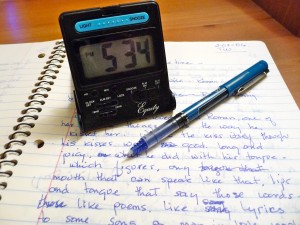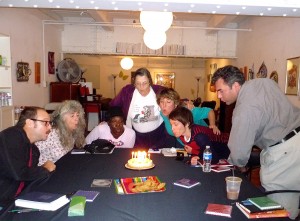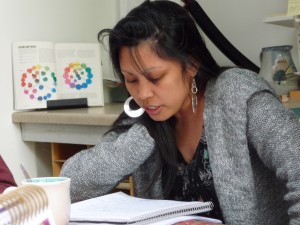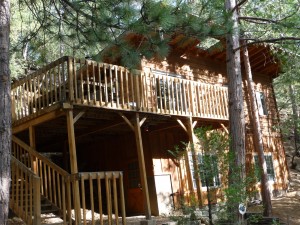Starting this week, every Tuesday at Noon you’ll find me at The Ink Spot writing with the Brown Bag Writing Group. I’m glad to be back; I’ve missed the time and the place and writing with my co-facilitator, Rob Williams and the writers who gather around the Fish Tables with their notebooks and pens, their laptops and enthusiasm.
I’m a fool for writing practice groups. I’ve been leading them for nearly two decades. Brown Bag, the original, started in 1993 at The Writing Center in San Diego and Thursday Writers, which I now co-facilitate with Steve Montgomery, a couple of years later. For those of us who are regular practitioners, there’s something in addition to the writing that makes these groups special: A collective energy occurs when we come together with writing as our purpose—a creative force to be reckoned with. Some call it magic. I say the Muse likes to work crowds.
Here’s how my writing practice groups work:
 Writers gather, the “rules” are read, a prompt is given and a time limit set. For the next 12 or 15 or 18 minutes, the only sound that’s heard is the scratching of pen on page, the faint tap tap tap of fingers on keyboard. Then, after each writing session, writers are invited to read their work aloud, without preamble and not for feedback, (no critique is given), but to hear their voice and to honor their words.
Writers gather, the “rules” are read, a prompt is given and a time limit set. For the next 12 or 15 or 18 minutes, the only sound that’s heard is the scratching of pen on page, the faint tap tap tap of fingers on keyboard. Then, after each writing session, writers are invited to read their work aloud, without preamble and not for feedback, (no critique is given), but to hear their voice and to honor their words.
Somehow, astonishingly, from the few words of the prompt and in those scant minutes, stories and poems and essays and scenes from novels get written right then and there—at least rough drafts. Memories appear that might take the form of a memoir or may be just a meander through time. Characters appear, disappear and reappear, sometimes migrating from one story to another, sometimes bringing a pal or a new lover.
Writing in a writing practice group is different than doing exercises in a workshop or classroom where the writer is given instruction to accomplish a specific task, and writing in group is different than a solitary writing practice where we set our own pace and work in our own circle of energy. The palpable energy of the group and the focus of timed writings ignites spontaneity and with it, the possibility that anything can happen. And it does! Surprises are a regular occurrence at these sessions where language and imagination meet on the page. “I don’t know where that came from,” is the frequently heard comment by one amazed writer or another.
8 reasons to be a part of a writing practice group:
- To have a regular time and place to show up with a commitment to get words on the page
- To experience the creative energy of the group and allow it to influence your writing
- To have a safe place to write what you want and to take risks
- To start something new or to continue a work-in-progress
- To read your work aloud with no concern for judgment or criticism
- To learn from other writers and spark one another’s creativity
- To bear witness to each other’s work
- To share camaraderie and create community
What’s your experience of writing in group?




